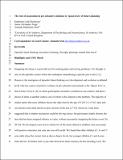The role of association in pre-schoolers' solutions to "spoon tests" of future planning
Abstract
Imagining the future is a powerful tool for making plans and solving problems. It is thought to rely on the episodic system which also underpins remembering a specific past event [1, 2, 3]. However, the emergence of episodic future thinking over development and evolution is debated [4, 5, 6, 7, 8, 9]. One key source of positive evidence in pre-schoolers and animals is the “spoon test” or item choice test [4, 10], in which participants encounter a problem in one context and then a choice of items in another context, one of which is the solution to the problem. A majority of studies report that most children choose the right item by age 4 [10, 11, 12, 13, 14, 15, cf. 16]. Apes and corvids have also been shown to pass versions of the test [17, 18, 19]. However, it has been suggested that a simpler mechanism could be driving choice: the participant simply chooses the item that has been assigned salience or value, without necessarily imagining the future event [16, 20, 21, 22, 23]. We developed a new test in which two of the items offered to children were associated with positive outcomes, but only one was still useful. We found that older children (5-, 6-, and 7-year-olds) chose the correct item at above chance levels, but younger children (3- and 4-year-olds) did not. In further tests, 4-year-olds showed an intact memory for the encoding event. We conclude that positive association substantially impacts performance on item choice tests in 4-year-olds and that future planning may have a more protracted developmental trajectory than episodic memory.
Citation
Dickerson , K L , Ainge , J A & Seed , A M 2018 , ' The role of association in pre-schoolers' solutions to "spoon tests" of future planning ' , Current Biology , vol. 28 , no. 14 , e2 , pp. 2309-2313 . https://doi.org/10.1016/j.cub.2018.05.052
Publication
Current Biology
Status
Peer reviewed
ISSN
0960-9822Type
Journal article
Description
KLD was funded by a Bobby Jones scholarship and by the University of St Andrews.Collections
Items in the St Andrews Research Repository are protected by copyright, with all rights reserved, unless otherwise indicated.

